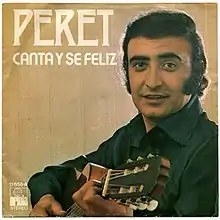Canta y sé feliz
"Canta y sé feliz" (Spanish pronunciation: [ˈkanta i ˈse feˈliθ], "Sing and Be Happy") is a song composed and recorded by Spanish singer Peret. It is best known as the Spanish entry at the Eurovision Song Contest 1974 in Brighton, United Kingdom.
| "Canta y sé feliz" | ||||
|---|---|---|---|---|
 | ||||
| Single by Peret | ||||
| from the album Peret | ||||
| Released | 1974 | |||
| Genre | Catalan rumba | |||
| Length | 2:48 | |||
| Label | Ariola Records | |||
| Songwriter(s) | Pedro Pubill Calaf | |||
| Peret singles chronology | ||||
| ||||
| Eurovision Song Contest 1974 entry | ||||
| Country | ||||
| Artist(s) | ||||
| Language | ||||
| Composer(s) | ||||
| Lyricist(s) | Pedro Pubill Calaf | |||
| Conductor | Rafael de Ibarbia Serra | |||
| Finals performance | ||||
| Final result | 9th | |||
| Final points | 10 | |||
| Entry chronology | ||||
| ◄ "Eres tú" (1973) | ||||
| "Tú volverás" (1975) ► | ||||
Background
The song is an up-tempo belonging to the Catalan rumba genre, with both music and lyrics by Pedro Pubill Calaf - Peret himself.
Eurovision
On the night of the final, the song performed in the third position, following United Kingdom's Olivia Newton-John singing "Long Live Love" and preceding Norway's Anne-Karine Strøm with "The First Day of Love", and at the close of the voting had received 10 points, placing 9th in a field of 17.
It was succeeded as Spanish entry at the 1975 contest by Sergio y Estíbaliz with "Tú volverás".
Sources and external links
- Official Eurovision Song Contest site, history by year, 1974.
- Detailed info and lyrics, The Diggiloo Thrush, "Canta y sé feliz".